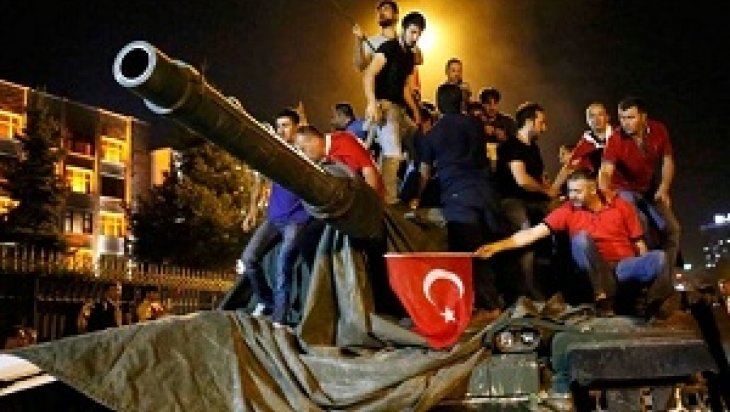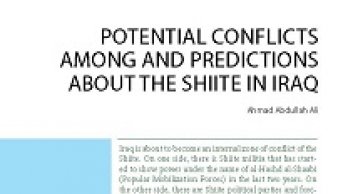Iraq's Attitude Towards the Failed Military Coup in Turkey

It was not surprising to see the reactions and attitudes that Iraq has shown towards the military coup in Turkey on the night of 15 July 2016. In the official statement of Iraqi government on 16 July, the following points were indicated: “Iraq respects the state institutions of all countries. Depending on the fundamentals of good neighborhood and good relations with Turkey, Iraq is not involved in Turkey's domestic affairs.” However, the political actors and other players in Iraq made completely different and contradictory statements while evaluating the coup night in Turkey. It is certain that these contradictory statements resulted from the tension and political differences in Iraq. Different political actors in Iraq adopt completely different attitudes towards and views about the regional issues and neighboring countries of Iraq. Iraq's attitude towards the military coup in Turkey can be evaluated in three aspects: Firstly, the official attitude of Iraqi government; secondly, the attitude of the political actors in Iraq and, thirdly, the attitude of the society.
As to the official attitude of the Iraqi government, on Saturday, 16 July, the second day of the military coup attempt, the National Security Council at Ministerial Level held an urgent meeting on the coup attempt in Turkey under the chairmanship of Haider al-Abadi. In the statement made by the press office of Haider al-Abadi after the meeting, the Council emphasized that “the state institutions of all countries should be respected and, within this context, the rights and national will of Turkey and Turkish citizens should also be respected.”
During the meeting, the Council indicated: “Iraq respects the state institutions of all countries. Depending on the fundamentals of good neighborhood and good relations with Turkey, Iraq is not involved in Turkey's domestic affairs.” National Security Council at Ministerial Level also added that “it hoped to see stability in Turkey. Blood should not be shed among Turkish people.” Ministry of Foreign Affairs of Iraq evaluated the military coup attempt in Turkey as follows: “The problem is one of Turkey's domestic affairs; the security of its citizens is important and democracy should be respected in Turkey and state institutions should maintain their relations with international community and neighboring countries.” Carefully considering the statement of Prime Minister Haider al-Abadi and Foreign Ministry, it is clearly seen that there is a generalization and they abstain from adopting definite attitudes in these statements. On the other hand, one point also needs to be emphasized. Al Iraqiya, the official TV channel of Iraqi government, came under criticism because it broadcast falsified news about the military coup attempt as well as Iraqi government which is criticized for neglecting the broadcast of such news.
Al Iraqiya channel appeared to have welcomed the coup attempt by publishing falsified and exaggerated news about the military coup. However, Iraqi President Fuad Masum clearly stated his attitude as follows: “Iraq is highly hopeful that Turkey, its neighboring country, will overcome this crisis. I believe that Turkey will successfully go through this extraordinary situation.” On the other hand, the most explicit statement was made by Speaker of Iraqi Parliament Salim al-Jabouri. In his statement, Jabouri indicated that “Iraqi Parliament acts in full solidarity with the Grand National Assembly of Turkey, the victim of the attacks of the coup plotters. It was an inspiration for Iraqi politics that all the political parties in Turkey adopted a common stance against the coup attempt and democratic system should be protected and all parties in Turkey should respect the political process.” He also said that democracy was a "safety valve" for the stability of each country.
In conclusion, the official statements of three offices (office of the president, prime ministry, office of the speaker of the parliament) about the coup attempt in Iraq are balanced and acceptable. Meanwhile, it is possible to say that each office in Iraq belongs to a different structure (political actor) in the sectarian quota system. This system governs Iraq and this situation causes each office to adopt different attitudes and views from each other. At the same time, the attitudes of the offices are also affected by the sectarian pressures. Considering the attitudes of the political movements, powers and parties in Iraq in the news and comments on TV channels or on the social media accounts, we see very different and contradictory statements. We can say that some of these attitudes are quickly adopted, unbalanced, very emotional and away from constituting a political approach. For example, Deputy Hanan al Fatlawi who was previously the member of the Rule of Law Coalition of Nouri al-Maliki and later formed an independent body welcomed the coup attempt from the very beginning and shared statements especially on Facebook that would be acceptable for a deputy under no circumstances. In contrast, some Iraqi politicians made wise and reasonable statements about the failed coup attempt.
Turkmen Deputy Jasim Mohammed Jaafar Bayatli criticized the statement of the Ministry of Foreign Affairs of Iraq and said: “The failed coup attempt in Turkey was an initiative to overthrow the legitimate government in the country and Iraq’s attitude towards the coup attempt in Turkey is not appropriate.” Bayatli added: “Iraq’s attitude towards the coup attempt in Turkey is weak and inappropriate. It painted the coup attempters and the elected government with the same brush instead of siding with the legitimate and elected government in Turkey. Military coup is a domestic affair. This coup attempt threatens legitimacy and democracy and gives a negative message to the citizens who voted in the elections.” It should be known that Bayatli is the member of the party of former Prime Minister Maliki and he is also known to stand against the policies of Turkish President Recep Tayyip Erdogan.
Generally considering the approaches of Iraqi political powers towards the coup, Iraqi coalition forces (Sunni deputies), notably Turkmen deputies, were clearly against the military coup attempt. At the second stage, Kurdish deputies of the Kurdistan Democratic Party (KDP) acceptably stood against the coup attempt. Shiite deputies showed little reaction and Patriotic Union of Kurdistan (PUK) and Movement for Change (Gorran) Party showed the weakest and slightly explicit reaction to the coup attempt.
When we consider the anti-coup attitude of Iraqi society in the social media, a social and cultural fact unfortunately emerges and causes agony and disappointment. There was a fight going on between those who were against the coup attempt and those who welcomed the coup in the social media at the earlier hours of the coup attempt. The biggest agony is that neither those who were against the coup attempt nor those who welcomed the coup had reasonable or acceptable views and these views showed that none of them took Iraq’s interests into consideration in case of a successful or failed coup.
These stated views reflect an attitude composed of the reactions and feelings caused by the developments and political sectarianism in Iraqi society since 2003. The positive or negative attitudes of Iraqi society towards the coup attempt in the social media do not reveal Iraq’s interests but those of its own political parties and sectarian actors.
Whatever attitude Iraq adopts towards the coup attempt, Iraqi people should learn an important fact: A successful military coup in Turkey would bring four major risks for Iraq. The first risk is that a big support would be given to the terror organizations in the region if the coup had been successful, since terror organizations adopt the method of launching armed attacks in order to reach their targets and consider all the democratic systems in the region imaginary and fantastic. They believe that the people in the region will be able to enjoy their own rights again only by launching armed attacks. The second risk is that a successful coup attempt in Turkey would probably have increased the appetite of Iraqi Armed Forces to overthrow Iraqi government. Especially now, the forces affiliated with the government, armed militia and armed groups of the parties are intermingled. The political pressure on Iraqi Armed Forces is clearly seen.
The third risk is that there would have been instability in terms of security, economy, society and politics for a long time if the coup had been successful in Turkey. When we look at the history of the region, any trouble or disorder that one country faces negatively affects the neighboring countries and causes problems. Iraq has its hands full of its current problems. The fourth risk is that security, economic and political disorders would possibly emerge and “600,000” Iraqi migrants living in Turkey would have to leave the country if the coup had been successful. Iraqi government would have difficulties and feel a pressure on itself if so many migrants had had to return from Turkey to Iraq since it would be very difficult for Iraqi institutions to meet the needs of so many migrants and provide services to them.
Therefore, each Iraqi citizen should think twice before adopting an attitude towards the failed coup attempt in Turkey and answer the following question: “Would this coup be to the benefits or disadvantage of Iraq if it had been successful?” Iraqi citizens should conscientiously evaluate the contemporary relations between Turkey and Iraq in the light of the past and should show their attitude by considering the positive positions towards Iraq and cooperation fields under AK Party government compared to the other governments in Turkey. They should not attach importance to nominal problems between Turkey and Iraq, since these problems can be easily solved provided that a real will is shown in order to solve these problems between the two countries and the international and regional factors are set aside.







